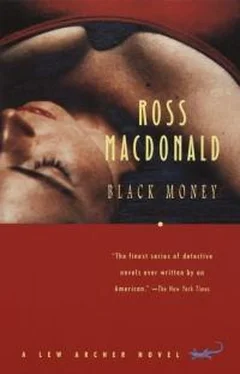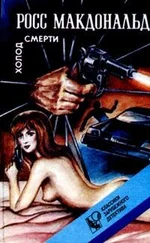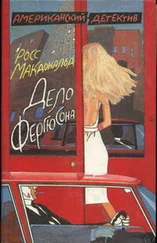“First, tell me just what you expect in return for your money.”
“I want you to find out who Martel is and where he came from and where his money came from. And why he came here to Montevista in the first place. Once I know something about him, I’m sure I can make Ginny see reason.”
“And marry you?”
“And not marry him. That’s all I hope to accomplish. I don’t suppose she’ll ever marry me.”
But he carefully put the engagement ring away in the watch pocket of his trousers. Then he wrote me a check for three hundred dollars drawn on the Pacific Point National Bank.
I got out my little black book. “What’s Ginny’s full name?”
“Virginia Fablon. She lives with her mother, Marietta. Mrs. Roy Fablon. Their house is next door to ours on Laurel Drive.”
He gave me both addresses.
“Would Mrs. Fablon be willing to talk to me?”
“I don’t know why not. She’s Ginny’s mother, she’s interested in her welfare.”
“How does Mrs. Fablon feel about Martel?”
“I haven’t discussed him with her. I think she’s taken in, like everyone else.”
“What about Ginny’s father?”
“He isn’t around any more.”
“What does that mean, Peter?”
The question bothered him. He fidgeted and said without meeting my eyes: “Mr. Fablon died.”
“Recently?”
“Six or seven years ago. Ginny still hasn’t got over it. She was crazy about her father.”
“You knew her then?”
“All my life. I’ve been in love with her since I was eleven.”
“How long is that?”
“Thirteen years. I realize it’s an unlucky number,” he added, as if he was collecting signs of bad luck.
“How old is Ginny?”
“Twenty-four. We’re the same age. But she looks younger and I look older.”
I asked him some questions about the other man. Francis Martel had driven his own black Bentley into Montevista about two months ago, on a rainy day in March, and moved into the Bagshaw house, which he leased furnished from General Bagshaw’s widow. Old Mrs. Bagshaw had apparently got him into the Tennis Club. Martel seldom appeared there and when he did appear he hid himself in his second-floor cabana. The hell of it was that Ginny had taken to hiding there with him, too.
“She even dropped out of school,” Peter said, “so she could be with him all the time.”
“What school was she going to?”
“Montevista State. She was majoring in French. Virginia has always been crazy about French language and literature. But she dropped it, just like that.”
He tried to snap his fingers: they made a sad squeaking sound.
“Maybe she wanted more of the real thing.”
“You mean because he claims to be a Frenchman?”
“How do you know he isn’t?”
“I know a phony when I see one,” Peter said.
“But Ginny doesn’t?”
“He has her hypnotized. It isn’t a normal healthy relationship. It’s all mixed up with her father and the fact that he was part French. She flung herself into this whole French business the same year that he died, and now its coming to a head.”
“I don’t quite follow.”
“I know, I don’t express myself too well. But I’m worried sick about her. I’ve been eating so much I’ve given up weighing myself. I must weigh over two hundred.”
He palpated his stomach, cautiously.
“Roadwork would help.”
He looked at me in a puzzled way. “I beg your pardon?”
“Get out on the beach and run.”
“I couldn’t, I’m much too depressed.”
He sucked up the last of his malted, making a noise like a death-rattle. “You’ll get to work on this right away, won’t you, Mr. Archer?”
Montevista is a residential community adjacent to and symbiotic with the harbor city of Pacific Point. It has only one small shopping center, which calls itself the Village Square. Among its mock-rustic shops the Montevistans play at being simple villagers the way the courtiers of Versailles pretended to be peasants.
I cashed Peter’s check at the Village branch of the Pacific Point National Bank. The transaction had to be Okayed by the manager, a sharp-eyed young man in a conservative gray suit whose name was McMinn. He volunteered that he knew the Jamieson family very well; in fact the older Peter Jamieson was on the bank’s board of directors.
McMinn seemed to take a dim but lofty pleasure in mentioning this, as if money conferred spiritual grace, which could be shared by talking about people who had it. I enhanced his pleasure by asking him how to get to the Bagshaw house.
“It’s away back in the foothills. You’ll need a map.”
He rummaged in the bottom drawer of his desk and produced a map, on which he made some markings. “I suppose you know that General Bagshaw is dead.”
“I’m sorry to hear it.”
“We were devastated here at the bank. He always did his local banking with us. Mrs. Bagshaw still does, of course. If it’s Mrs. Bagshaw you want to see, she’s moved into one of the cottages at the Tennis Club. The house is leased to a fellow by the name of Martel.”
“You know him?”
“I’ve seen him. He does his banking at our main office downtown.”
McMinn gave me a quick suspicious look. “Are you acquainted with Mr. Martel?”
“Not yet.”
I drove back into the foothills. The slopes were still green from the rains. The white and purple flowers on the brush gave out a smell like the slow breath of sunlight.
When I stopped my car at the Bagshaw mailbox, I could see the ocean below, hung on the horizon like unevenly blued washing. I had climbed only a few hundred feet but could feel the change in temperature, as if I had risen much nearer to the noon sun.
The house sat alone in its own canyon head, several hundred feet above the road. It looked almost as tiny as a bird-house. A blacktop driveway hair-pinned up to it from where I was parked.
A convertible with a snarl in the gearbox was toiling up behind me from the direction of town. It passed me, an old black Caddie, gray with dust, and stopped in front of my car.
The driver got out and came toward me. He was a middle-sized man wearing a hound’s-tooth jacket and a good-looking pearl gray fedora, which he wore at a cocky slant. He moved with a kind of quick embarrassed belligerence. I had no doubt that he was Peter’s “detective”, but he didn’t look like a detective to me. An air of desperate failure hung about him like a personal odor.
I got out my black book and made a note of the Cadillac’s license number. It had California plates.
“What are you writing?”
“A poem.”
He reached through the open window for my notebook. “Let’s see it,” he said in a loud unimpressive voice. His eyes were anxious.
“I never show work in progress.”
I closed the book and put it back in my inside breast pocket. Then I started to turn up the window on his arm. He yanked his arm away and pressed his face against the glass, blurring it momentarily with his breath.
“I want to see what you wrote about me.”
He took a miniature camera out of his pocket and rapped on the window with it, foolishly and frantically. “What did you write about me?”
It was the kind of situation I liked to avoid, or terminate quickly. As the century wore on – I could feel it wearing on angry pointless encounters like this one tended more and more to erupt in violence. I got out on the right-hand side and walked around the front of the car toward him.
As long as I was in my car, he had been yelling at a machine, a Cadillac yelling at a Ford. Now we were both men, and he was shorter and narrower than I was. He stopped yelling. His whole personality changed. He wiped his mouth with the back of his hand, as if to disclaim the evil spirit that had invaded him and made him yell at me. Self-doubt pulled at his face like a surgically hidden scar.
Читать дальше







